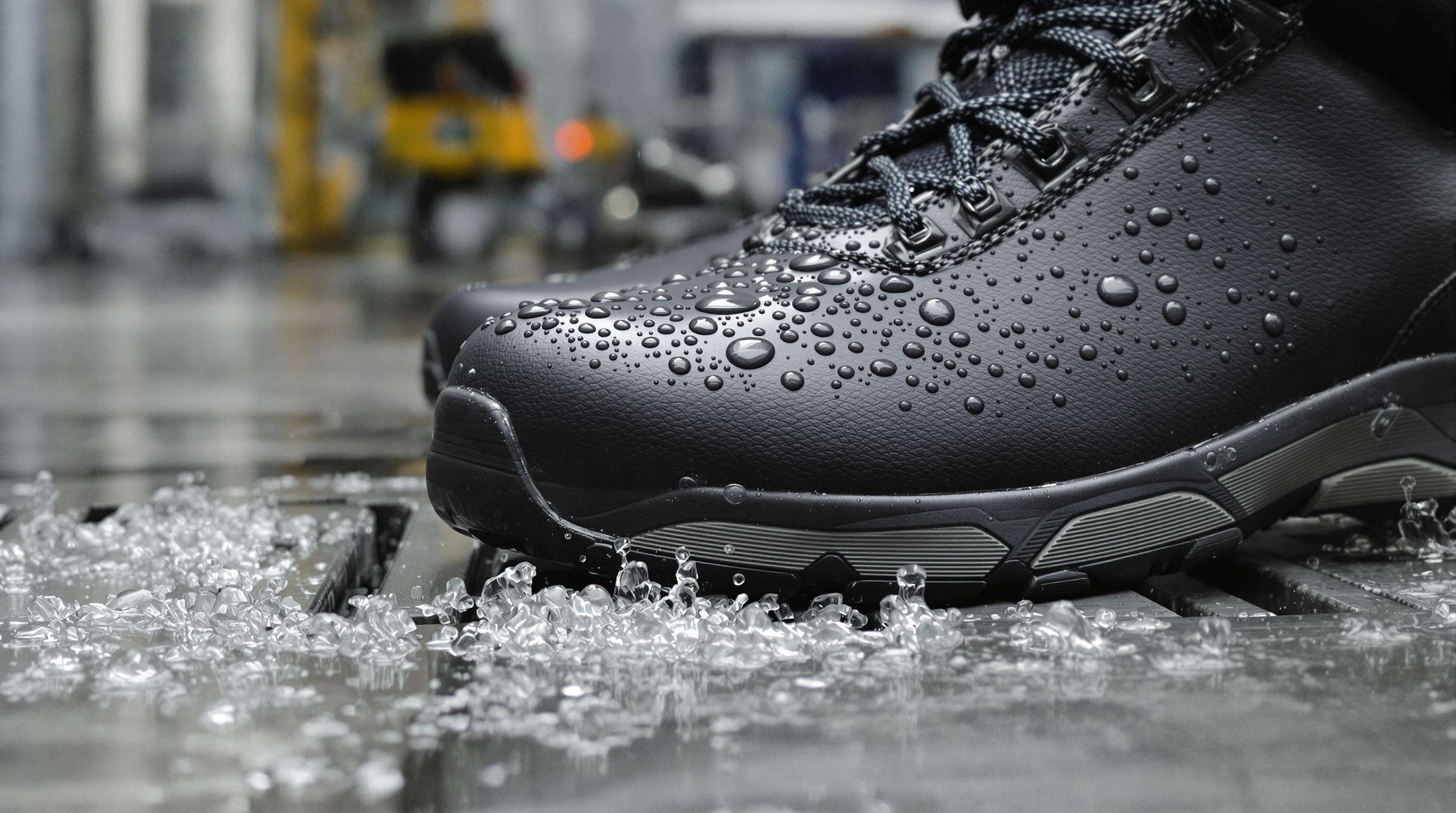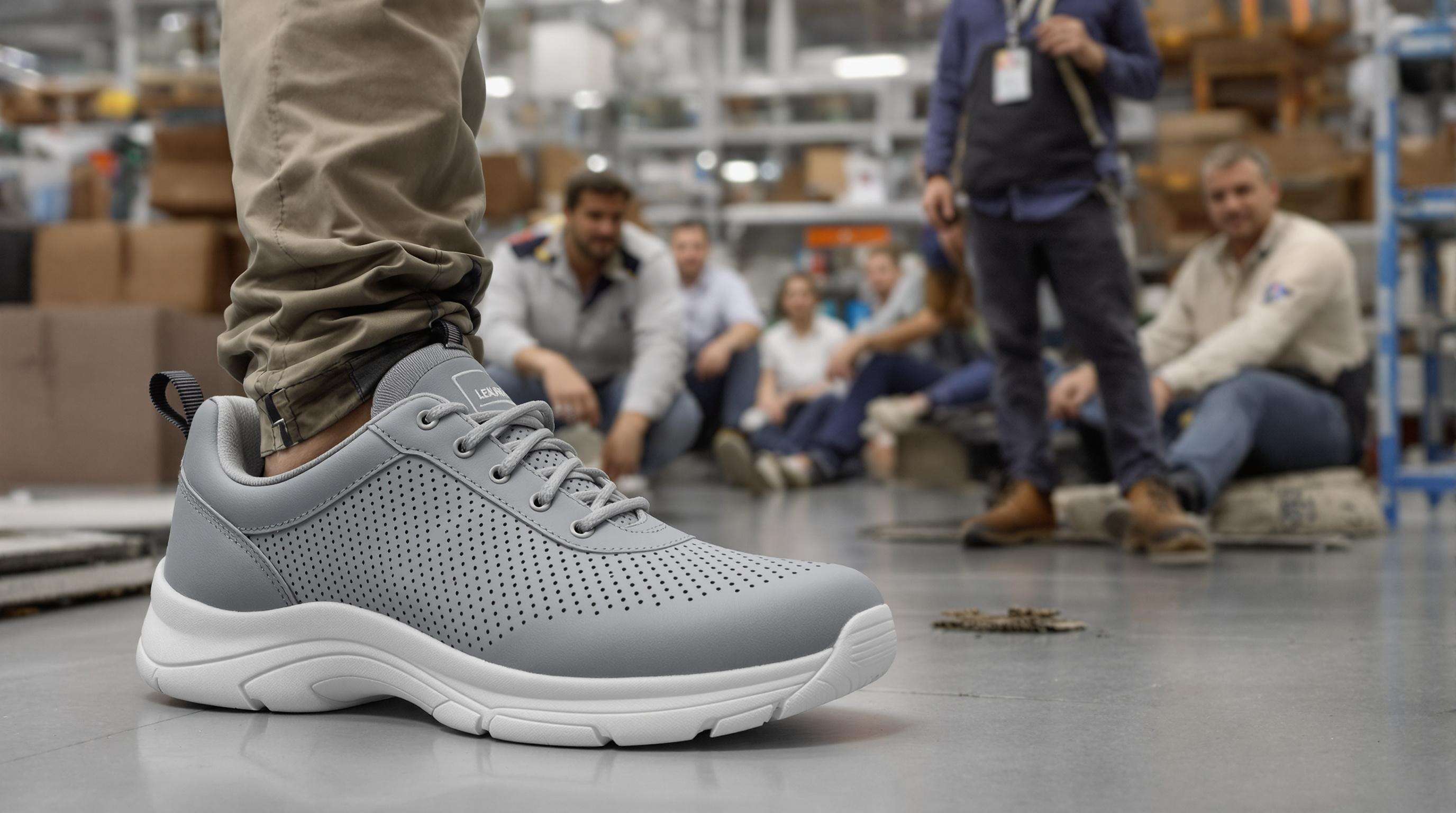Polyurethane (PU) leather combines advanced safety features with lightweight flexibility, making it a leading choice for industrial and commercial safety sneaker shoes. Its synthetic composition addresses critical workplace demands—from durability to hazard protection—without sacrificing comfort.
Polyurethane leather is basically polyester fabric covered in special polymer layers that help it handle all sorts of everyday wear and tear from bumps, scratches, and even chemicals. Traditional leather can't hold up quite so well when things get really hot or cold though. Tests show PU leather stays strong between about -30 degrees Celsius and 120 degrees Celsius according to research published last year in the Material Science Journal. For workers who need reliable foot protection, these properties mean their safety shoes actually pass those tough ANSI Z41-1999 requirements for industrial work boots. Plus, people don't have to suffer through long break-in periods anymore since new PU leather shoes feel comfortable right away about 40% faster than older materials.
Tests from the Footwear Industry Report 2024 show PU leather can withstand almost twice as much wear and tear compared to real leather during those accelerated testing sessions. When it comes to tear strength, we're talking around 20 newtons per square millimeter which makes it pretty durable for workers who spend all day on their feet in factories or warehouse environments. To make these materials even better, manufacturers throw in some clever tricks like creating cross linked polymer structures that stop cracks from forming. They also apply special coatings that resist UV damage so the material doesn't turn yellow over time. And let's not forget about keeping things clean - most products get treated with antimicrobial stuff to help maintain proper hygiene standards in industrial settings where cleanliness matters a lot.
Outsoles made from polyurethane hit around 0.45 coefficient of friction when wet, which actually beats what OSHA requires at 0.30 for places like restaurants and hospitals. The shoes with those multi-directional treads cut down slips by about 30 percent over regular smooth rubber soles according to Workplace Safety Study folks back in 2023. Some newer models mix PU cushioning in the midsole area with tough carbon rubber heels too. This combo works pretty well against oil slicks commonly found in industrial kitchens and manufacturing floors where accidents happen all too often.

The main reason PU leather works so well against water is because it doesn't absorb much at all. Spills and even light rain just bead up on the surface instead of soaking through. What makes this material particularly good for work boots is how it stays flexible despite being waterproof. Safety shoes need to bend and flex throughout the day without losing their protective qualities. Tests conducted by third parties found that these PU coated materials still repel water about 95% as effectively after going through 500 bending motions as they did when new. That means workers handling occasional liquids on factory floors or construction sites can count on their footwear performing reliably over time.
PU leather stands up really well against mold, won't break down in UV light, and can handle chemical spills without issue, which makes it work great in tough environments. Recent tests on materials showed that polyurethane keeps its protective properties even when exposed to water for long periods. The smooth surface doesn't let bacteria build up either, so these shoes are actually pretty good for places like food factories or hospitals where keeping things clean matters a lot. That combination of staying clean and lasting through rough treatment is why many professionals choose them for their jobs.

Modern PU leather sneakers often feature tiny holes throughout the material along with special inner linings that pull sweat away from the skin, making them much better at keeping feet cool when worn all day long. A recent survey from 2023 on workplace footwear found that nearly nine out of ten safety experts noticed less foot tiredness when workers wore these kinds of shoes instead of regular leather ones. The design actually draws inspiration from studies on fabrics that adapt to body temperature changes. Researchers have been looking at ways to improve air circulation around the foot for years now, and manufacturers are finally putting those ideas into practice with real results.
| Feature | PU Leather Safety Shoes | Traditional Leather Shoes |
|---|---|---|
| Breathability | High (micro-perforated) | Moderate (non-porous) |
| Moisture Evaporation | 2.3x faster | Baseline |
| Weight per Shoe | 10.2 oz | 14.7 oz |
The combination of flexible PU leather panels with reinforced nylon overlays helps feet move naturally while still keeping workers safe. The shoes feature anatomical arch support and cushioned midsoles that spread out pressure across the foot. This design actually led to about a third more productivity when it comes to comfort in several industrial settings according to research. What really makes these stand out though are the contoured heel counters and padded collars that stop those annoying pressure points from developing. For people who need to wear them all day long during 12 hour shifts in hospitals, factories, or hotels, these details make all the difference between getting through the day and suffering from sore feet.
Advanced manufacturing techniques allow PU leather sneakers to replicate the look of premium leather through embossed textures and matte finishes. This synthetic alternative offers uniform appearance and eliminates the break-in period, providing immediate comfort and a polished appearance for safety sneaker shoes in both corporate and industrial settings.
Today's safety footwear blends function with modern style:
A 2024 Footwear Industry Report notes that 68% of workplaces now permit leather-look safety shoes in business-casual dress codes, up from 49% in 2021.
Monochromatic PU leather safety sneakers offer versatile styling options:
| Feature | Black PU Leather | White PU Leather |
|---|---|---|
| Stain Resistance | Conceals oil/marks | Micro-scratch resistant coatings |
| Style Pairing | Matches belts/watch straps | Brightens uniform combinations |
| Maintenance | Wipe-clean with damp cloth | Antimicrobial treated surfaces |
These styles maintain OSHA-compliant toe protection and slip-resistant soles while delivering a professional appearance. Water-resistant PU leather uppers also resist salt stains and watermarks, preserving their look through seasonal changes.
The non porous nature of PU leather means it doesn't soak up oils, chemicals or those pesky biological contaminants, which is why it works so well in places that need constant cleaning. Traditional leather tells a different story though. With PU, there's absolutely no need for special conditioning treatments. Just grab a damp cloth and wipe down surfaces, and studies show this gets rid of around 98 percent of stuff stuck on the surface according to industry reports from last year. Real world experience backs this up too. Many facilities that made the switch to PU based shoes saw their cleaning routines cut down by about 40% while still meeting all the necessary safety requirements for microbes.
| Material | Cleaning Steps | Dry Time |
|---|---|---|
| Traditional Leather | Brush, Condition, Polish | 2+ hours |
| PU Leather | Wipe with damp cloth | 15 minutes |
PU leather safety sneakers tend to last anywhere from 8 to 12 months longer than real leather ones when used in factories and warehouses because they don't crack as easily, resist scuffing better, and handle moisture much more effectively. Workers end up replacing their shoes about 30% less often each year according to some studies, which translates to roughly $200 saved per person over five years, says the Industrial Safety Journal from 2023. Most places also notice reduced waste expenses since old PU shoe tops can actually get recycled into parts for new boots something traditional leather just cant do. About 7 out of 10 facilities have seen this benefit firsthand.
PU leather is ideal for safety sneaker shoes because it combines advanced safety features with lightweight flexibility. It offers durability, hazard protection, and comfort, making it a preferred choice in industrial and commercial settings.
PU leather can withstand almost twice as much wear and tear as traditional leather in accelerated testing sessions. It features tear strength of around 20 newtons per square millimeter and includes advanced coatings to resist UV damage, making it more durable for industrial use.
Yes, PU leather has inherent waterproof properties. It doesn't absorb water, and spills or light rain bead up on the surface instead of soaking through. This makes it ideal for work boots that need to flex without losing protective qualities.
PU leather requires low maintenance as it doesn't soak up oils or contaminants, simplifying hygiene. It lasts 8 to 12 months longer than traditional leather, reducing the frequency of replacements and resulting in cost savings.
Copyright © 2024©Shandong Max Gloves Sales Co., Ltd.——Privacy Policy